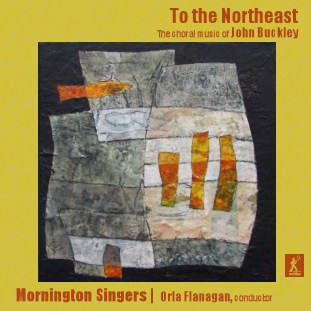Fanfare
Although a full CD of choral music by a single composer might be a one-dimensional affair, stylistically, John Buckley’s music resists classification in a single “school” or “ism.” This makes for a pleasantly diverse listening experience. On the present recording, Orla Flanagan and the Mornington Singers have put together an anthology of the Irish composer’s choral works that spans over 40 years (if one accounts for revised works) and showcases Buckley’s aesthetic and technical range.
The program begins seriously, with a 1984 setting of Shelley’s poem “Music, When Soft Voices Die.” Buckley’s music is by turns gentle and urgent. In many ways it is an updating of the harmonic language and compositional approaches of the Renaissance madrigalists, who used every technique available to achieve a synthesis of music and text. Flanagan leads a taut performance that is responsive to Buckley’s contrasting swings and oblique allusions to his predecessors. This is followed by a setting of another Romantic poem, Keats’s “To Sleep.” Flanagan’s interpretation is evocatively heavy-lidded, with just the right balance of stillness and motion. Turning to the whimsical, Buckley’s 1996 Jabberwocky revels in the onomatopoeia of Lewis Carroll’s text, slithering here and bumping there. The choir navigates the textural changes nimbly, moving from complex counterpoint to block chords. Five Two-Part Songs for Children continues a juvenile thread, though the music traverses a full spectrum, from the haunting lullaby to more playful miniatures, finally closing with a noble setting of Michael Hartnett’s poem “Ireland is Our Country.”
Other standouts on the program include an arresting setting of Emily Bronte’s poem “There is a Spot Mid Barren Hills,” that veers from dissonant to lush, bare to rich. Buckley’s 2017 Lux Aeterna is the newest work on the program. It is deceptively simple, radiant polyphony unified by a four-note motive that winds its way through the counterpoint. The program closes with the track To the Northeast, a setting of three ninth-century Irish poems (sung in English). This may be the highlight of the entire recording. The choir is precise and energetic, but Buckley’s vivid, tingling choral writing is the real draw. Without resorting to superficial techniques and gimmicky word-painting, his music captures the essence of the landscapes described in the poems in a way that seems more three dimensional than the text itself.
The Mornington Singers turn in thoroughly committed, full-throated readings of each piece on the program, executed meticulously but without the sterility that sometimes accompanies such polished performances. Indeed, Buckley could not wish for better advocates of his music, which shines under Flanagan’s deft direction. These performances and the music itself are worth the attention of listeners looking for fine modern choral music that lies beyond the commercial mainstream.
@divineartrecordingsgroup
Search
Newsletter
A First Inversion Company
Registered Office:
176-178 Pontefract Road, Cudworth, Barnsley S72 8BE
+44 1226 596703
Fort Worth, TX 76110
+1.682.233.4978












